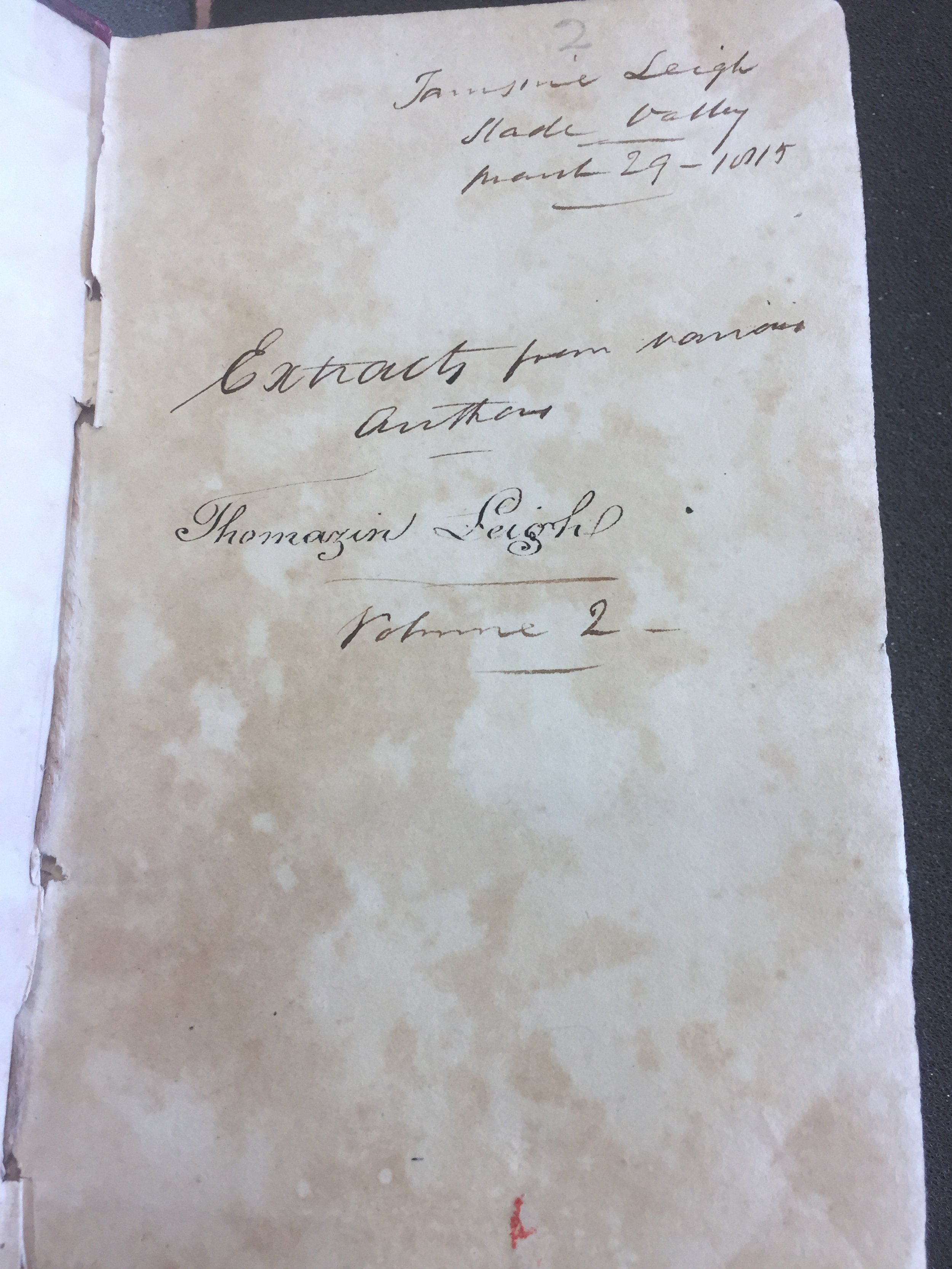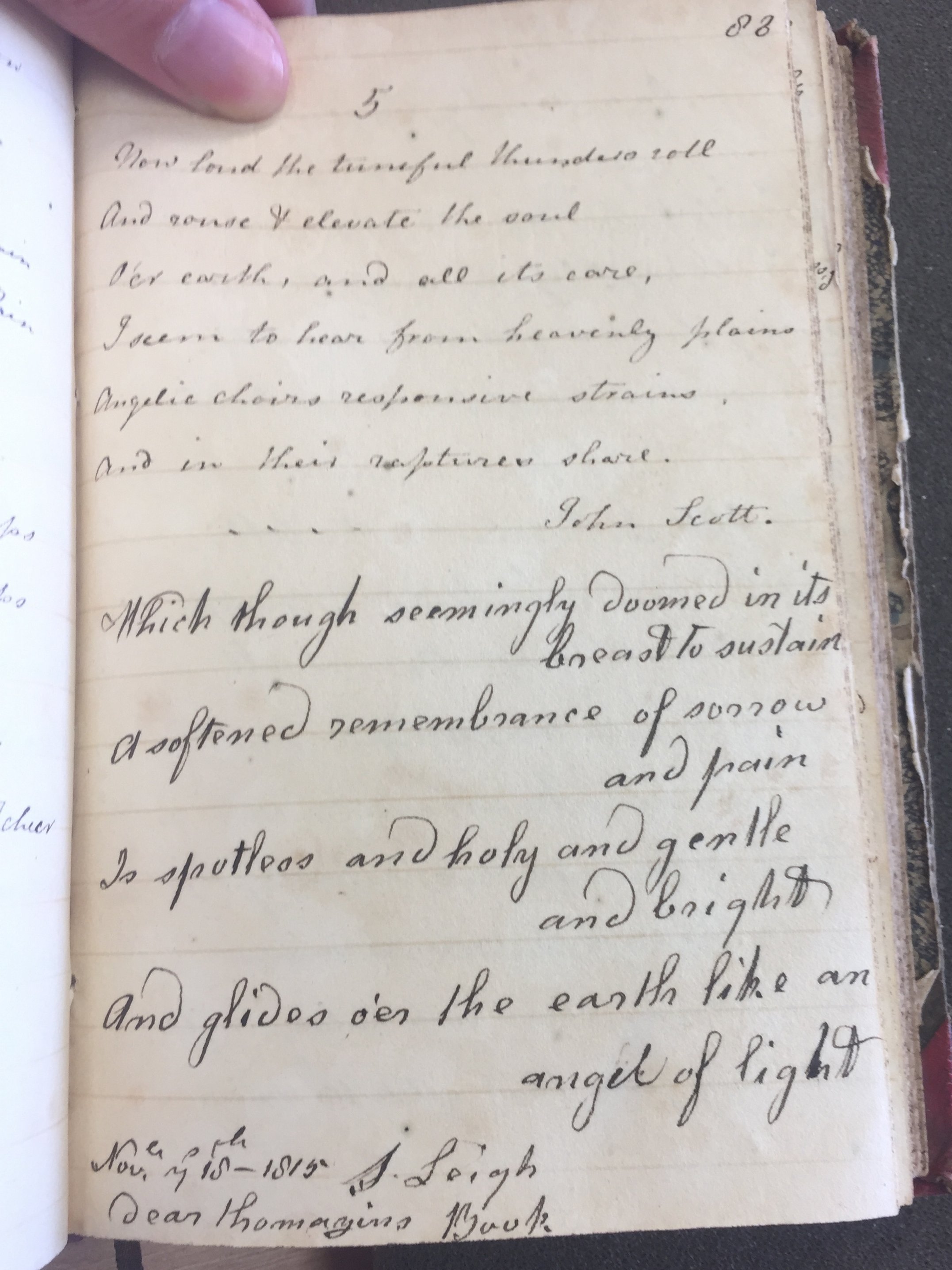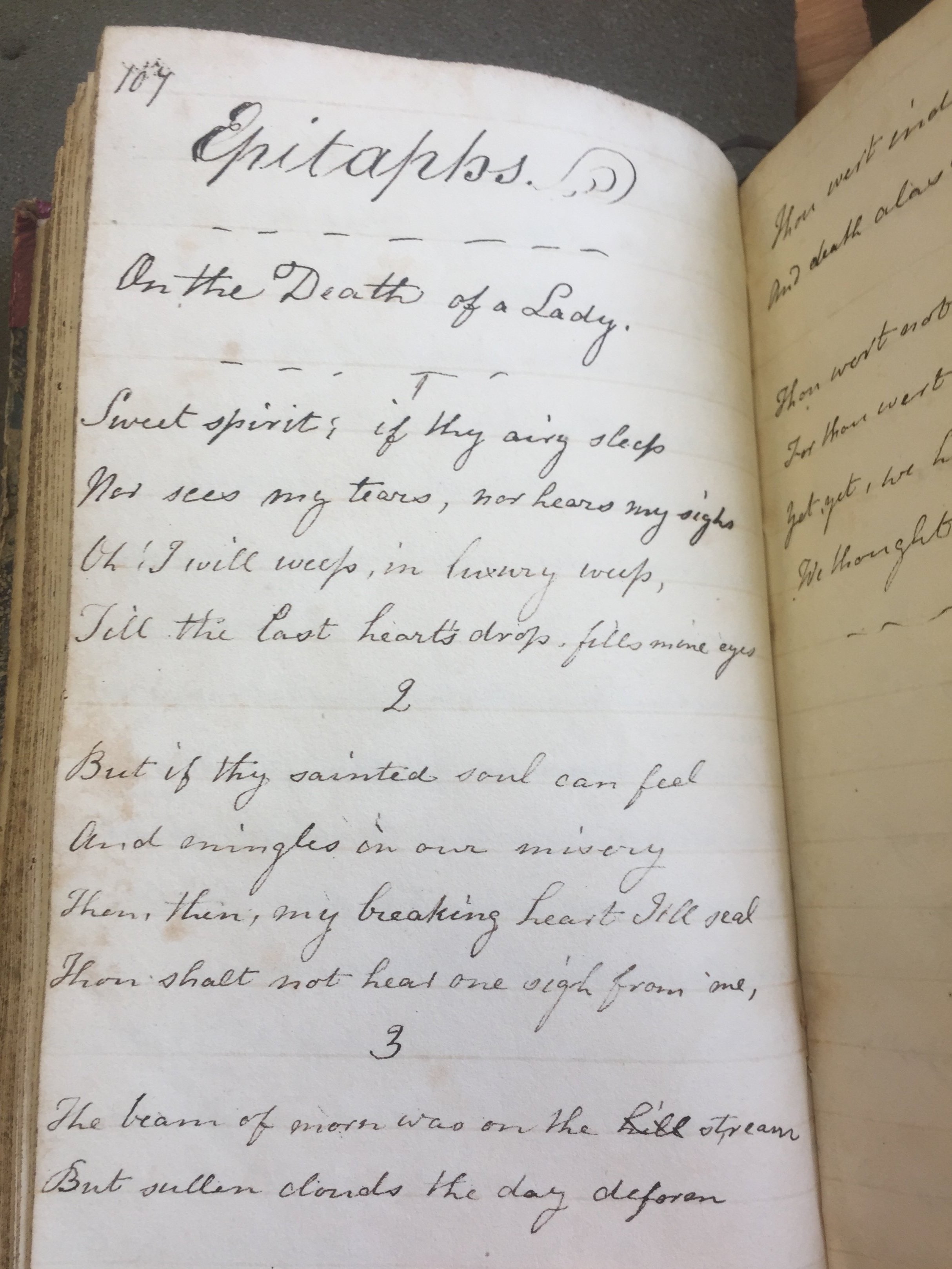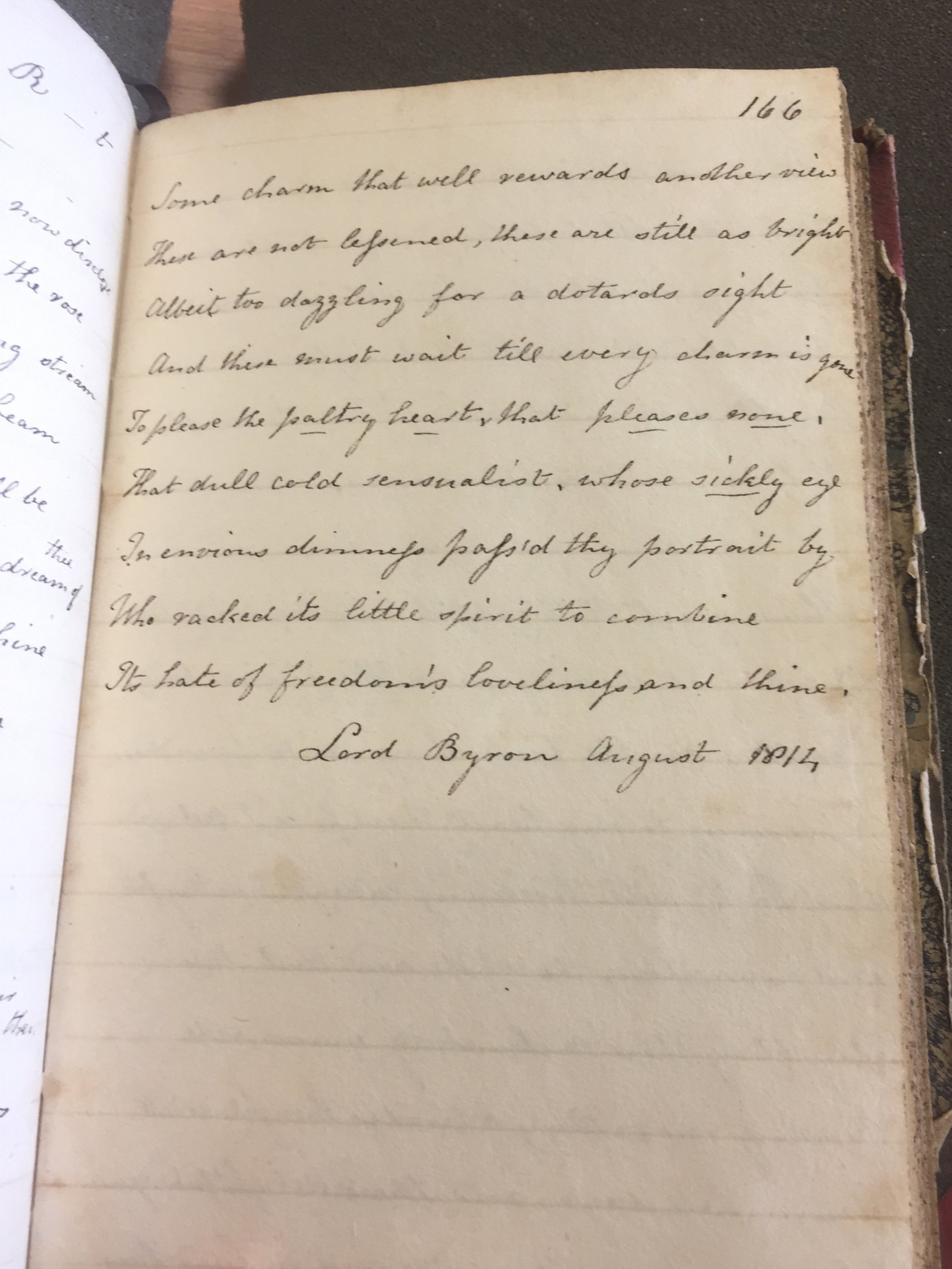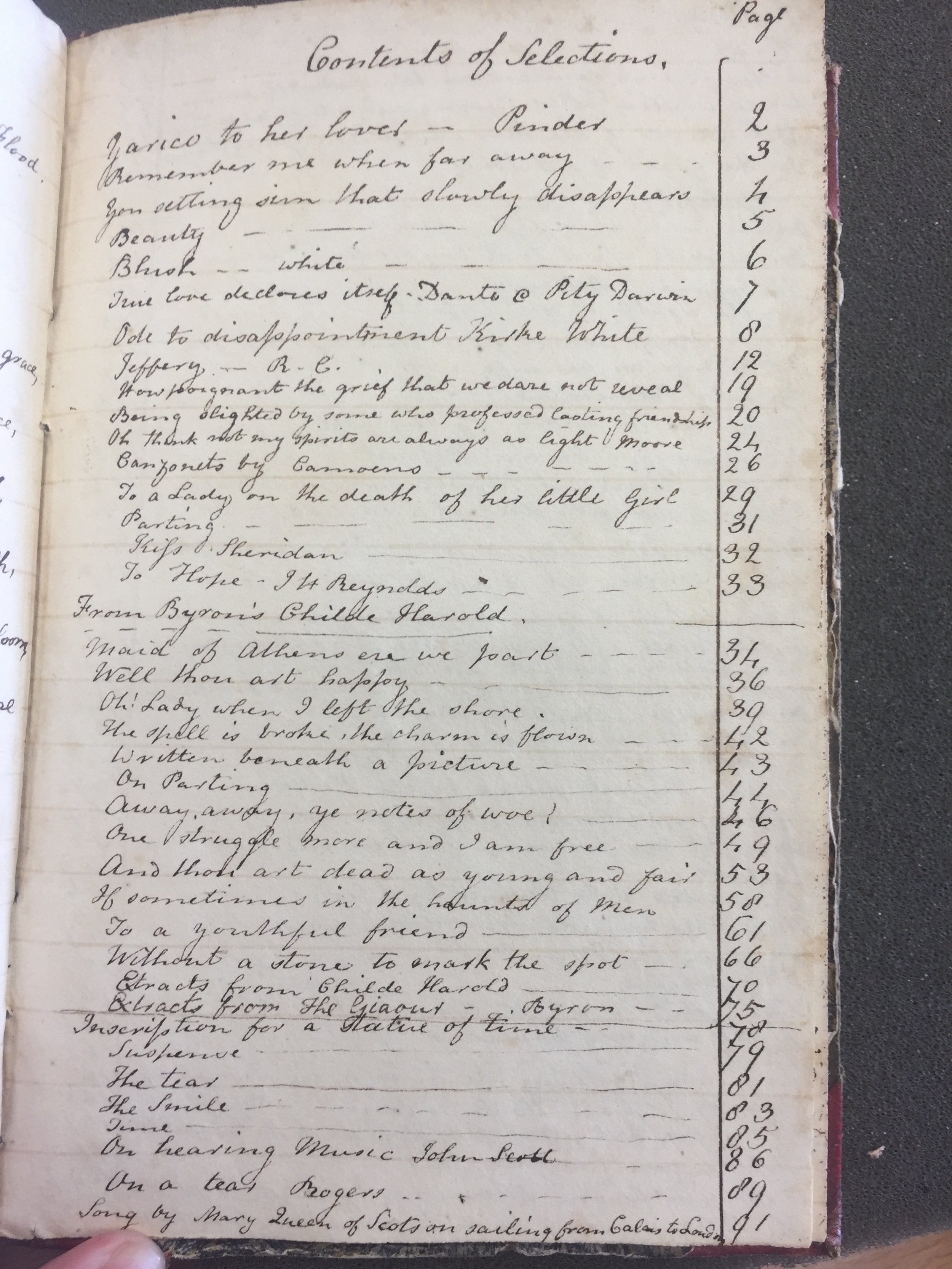K-SAA Digital Initiative 2023: A Public Commonplace Book of Romantic Readers—Mapping Global Readerly Networks Two Centuries Apart
Announcement:
The inaugural volume of the K-SAA Public Commonplace Book with its accompanying interactive Star Chart are now available (open access) here.
What are commonplace books? Dating back to classical antiquity, commonplace books were an increasingly popular medium for collecting inspiring quotes and organizing useful information and ideas—poetry, recipes, remedies etc. Romantic poets such as Dorothy Wordsworth and Lord Byron are known to have kept commonplace books, though not all are publicly available.
In the slide show below is a 1815 commonplace kept by Thomazine Leigh. Images by Dr Kacie Wills, courtesy of Keats House, City of London Corporation. K/MS/01/047, pp.88, 109, 166, 240 & endsheet. We are grateful to have been granted permission to share these images. Visit the Keats House website for their latest exhibitions & events.
We invite you to contribute to our public commonplace book, a new digital initiative to stitch together pieces of observations and ideas from the public to facilitate a mapping of the many lingering connections between global Romantic-era writers and the readers of today. Gathered from personal notebooks and public records alike, the digitalized records of historical reading communities and reading poets in resources like UK RED (Reading Experience Database), Chambers' Library Map of Borrowers, 1827-1830 and Libraries, Reading Communities & Cultural Formation in 18C Atlantic reveal the shifting interests as much as the habits of the masses. This year, we hope to hear from you and begin our digital initiative with an exploration of what the present community of readers know or may find out about the reading(s) and reading habits of the Romantics and their contemporaries—so that the reach of their writings may be visualized alongside glimpses of the global networks of ideas which may have remained elusive.
The digital commonplace book will compile crowd-sourced snippets of information centered on the “who” and “what” in acts of reading: titles, categories or genres (poetry, fiction, non-fiction; anthology, pamphlets etc.), topics, feelings, likes and dislikes, thoughts, comments, tendencies, parallels with their own writings, the sources of reading materials, reading companions, even metaphorical acts of reading. You may share your readings, or take some time to discover more about the reading(s)/habits of the Romantics by searching on databases such as UK RED, or by looking into their writings and freely available collections of their letters and journals in the Romantic Circles Electronic Editions.
After the one-month submission period which has been extended to May 18, 2023, we will make the digital commonplace book available on the K-SAA website—complete with your contributions and a visual account of the intriguing patterns therein. It is our hope that in it, and in the incoming entries which will be featured in our social media outlets in the coming weeks, you will discover something new about the Romantic circles of writers, and the digital resources for doing so.
There are two ways to submit an entry, each of which should contain the name of your chosen Romantic writer and title(s), along with an aforementioned detail surrounding their or your readings and reading habit (if any):
1. Fill out this webform below, providing any available categories of information, or simply a quotation with your source(s), and some demographic information such as your location/nationality,
2. Tweet or publish a post or quotation via your Twitter or Mastodon account, with the hashtag #KSAAcommonplacebook23i; please also include your location or nationality in the same post or thread.
e.g., in your own words,
“Percy Shelley [Romantic writer] read Rousseau’s Les Confessions [title], as has been recorded in The Journals of Mary Shelley 1814-1844 [source]. (Found on UK RED [or another database]).”
or, to quote from a published source,
“Read a little of Petronius [Satyricon] - a most detestable book” [quotation], in The Journals of Mary Shelley [original source information; Romantic writer]; UK RED [database].
This commonplace book encompasses Romanticism in its most capacious sense. We particularly welcome quotations from Romantic-era writers of color, circum-Atlantic writers, and writers of the global south.
Details of our data collection policy can be viewed below. For inquiries, please contact us at ksaacomms@gmail.com.
Mobile users may click here to open the form in a new window for better readability.
Privacy Policy & Data Collection Notice
Thank you for your interest in sharing your ideas with the broader Romantic community. Please read on for the details of our data collection policy. By participating in or responding to the K-SAA Digital Initiatives, you confirm that you understand and agree to the following policy on data collection:
1. Purpose and visibility
The purpose of data collection is to facilitate the mapping and understanding of the various connections between Romantic writers and their modern-day readers. The data you voluntarily provide via Twitter/Mastodon or our webform will be made public and open-access on the K-SAA website and social media outlets, and included in our digital commonplace book. This means that the information you provide may also potentially be used by third parties for research (non-commercial) purposes and always in compliance with the FAIR principles. To read more about the Creative Commons Attribution-NonCommercial 4.0 International License (CC BY-NC 4.0) under which our data will be released, click here.
2. Types of data collected
The data collected include your inputs and ideas in response to the given theme of the initiatives, demographic information including but not limited to: your first name, location/nationality, institutional affiliation (if any), and any other information you choose to provide. There is always an option for participants to withhold or anonymize parts of this information. We may try to evaluate this initiative by making references to the built-in web analytics data on this site, i.e. anonymized statistical data such as page views and clicks.
3. Withdrawing a submission
The K-SAA Communications team will make every effort to withdraw and delete the data contained in a submission upon request, though this cannot be guaranteed, especially long after the appointments of the current Communications Fellows have ended.




